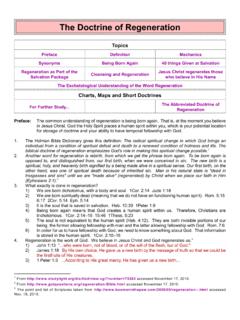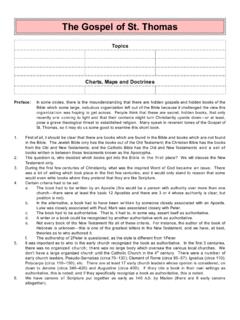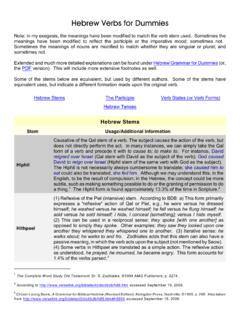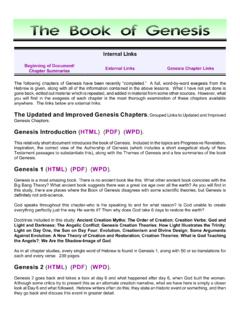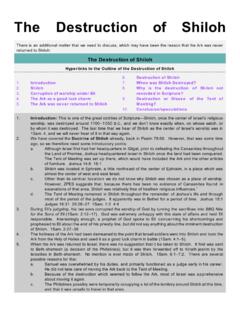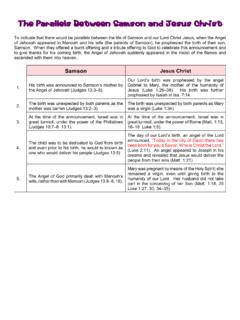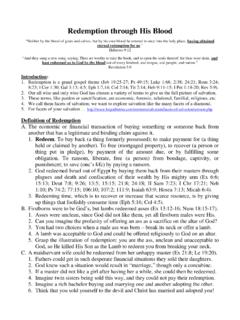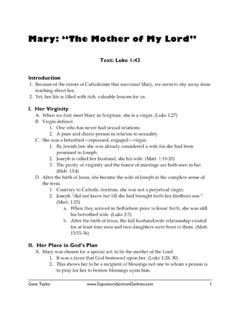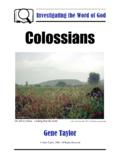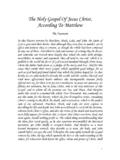Transcription of The Doctrine of Old Testament Sanctification (or …
1 The Doctrine of Old TestamentSanctification (or Consecration)TopicsDefinitionHebrewSanct ification is the Antithesisof Uncleanness, Defilement andProfaningThe firstborn are SanctifiedThe Sabbath Day andSanctificationConsecration (or Sanctification )of the PriestsConsecration of the Furnitureof the Tent of GodThe Failure of Moses: He DidNot Treat God as SanctifiedCharts and MapsThe Abbreviated DoctrineSanctification in the OldTestamentPreface:The bulk of information that we get concerning Sanctification will come out of the first three books ofMoses Exodus, Leviticus and Numbers. I will cover the first three points in the book of Genesis andthen the remainder of Scripture up until the book of Samuel in Deut.
2 29:1. Bear in mind that Sanctification , like all other major doctrines in the Bible, are revealed in time. That is,Moses had a better grasp of Sanctification than did Adam; Paul had a much better understanding ofsanctification than Moses did. Revelation in Scripture is progressive. We are primarily going to examineOld Testament Sanctification , but we will begin with what we know for both Old and New Testaments. Definition: Sanctification from the standpoint of man: Sanctification : When we believe in Jesus Christ (or Jehovah of the Old Testament ), we areeternally set apart to God. or Progressive Sanctification : After salvation, when we fall out of fellowship, we get back intofellowship by naming our sins to God.
3 As we grow spiritually, we are sanctified in our spiritual growth. Sanctification : When we receive our resurrection body in the end time. Definition: Sanctification from the standpoint of God: sets something aside for Himself. b. We might reasonably say, God sets something aside to be in service to Him or to glorify Him. : primary word rendered Sanctification is q dash ( ) [pronounced kaw-DAHSH], which means tobe [make] pure [clean, holy, separate, sacred]; to consecrate [sanctify, dedicate, hallow, set apart]. These are its Qal meanings. It is also spelled q d sh ( ) [pronounced kaw-DAYSH].
4 Strong's #6942 BDB #872. the Hiphil, q desh means to declare something holy, to consecrate [or, set apart to God] [something, , a priest], to regard [something or someone] as holy. Hithpael imperative of q dash means cause yourselves to be cleansed, purify yourselves, causeyourselves to become consecrated. The idea is that, people or things are set apart for the service ofGod, and that these things are then forbidden to used for profane (or common) purposes. Page -2-From Exodus 13 verb means that something is set apart to God or it is set apart for God; this something takes onthe quality of being sacred, holy, different from that which is tied to the earth.
5 Now let s see if its usagejives with the meanings sanctify is nearly always the translation of q dash (the KJV is very consistent in this regard). However, q dash may also be rendered to consecrate, to hallow (which words can also be used totranslate other Hebrew words). (or consecration) is definitely tied to being clean, as versus being unclean. When God statedsome of the foods that could and could not be eaten, the point was that God is clean, God is holy (the nouncognate for q dash). Therefore, His people should be holy and not eat that which is unclean. Lev. 11:41 45 word for making unclean is m g ( ) [pronounced taw-MAY], which means to make unclean, tobe unclean, to defile.
6 In the Piel, it generally means to declare or to pronounce unclean. Strong's #2930 BDB #379. consecrate, therefore, is the opposite of to make unclean, to defile. See also Lev. 22:3 (the word forconsecrate may be hidden in there; your translation may have rendered it to dedicate, to hallow). (or consecration) is presented as being the opposite of defilement and profaning. Lev. 21:1 is the same word as to make unclean (see the previous point). profane is the Hebrew word ch lal ( ) [pronounced khaw-LAHL], which means to pollute, to defile,to profane, to sully, to contaminate. Its root means to bore, by implication meaning wound, dissolve.
7 These are not the meanings of the word as used, but the root from which it comes. Strong's #2490 BDB #319, BDB #320. a sub-point, ch lal actually has three separate definitions and listings in BDB. However, I thinkthat we can correlate them. Men killed using swords and arrows, and those who died had beenpierced. Because death is so closely associated with defilement and uncleanness, this word alsocame to mean defiled, polluted., as well as pierce, bore. It means pollute, defile, profane. Profane1is something properly applied in relationship to God and to that which is holy, such as the Sabbath(see Lev.)
8 20:3 Neh. 13:18 Ezek. 23:39). Although I personally like the word defile, it is on the2archaic side for most; however, because of the recent trend of environmentalism, pollute hasreturned to us and its present-day meaning is apt. Another outstanding rendering (when not inreference to God or that which is holy) is the word corrupt, with additional synonyms sully andcontaminate. See Gen. 49:4 Ezek. 28:16. Finally, in Deut. 20:6, we have the third usage: thevineyard is, for all intents and purposes, virginal it has not been used or harvested from. It is ina pristine state. The first harvest makes the vineyard common, used, no longer in a pristine state.
9 , to sanctify (or to consecrate) is the opposite of to profane, to pollute, to defile, to corrupt, tocontaminate. See also Lev. 22:2 (the word sanctify may be hidden behind a word like to dedicate, tohallow in your translation). passage (Gen. 2:3 4) is the first occurrence of q dash. Here, God sets the Sabbath (Saturday) apartas something special, something different; it will stand as a memorial for all time as a testimony to God screation. Even the most resolute heathen follow a seven-day work week pattern. Nothing is said about manresting from his work at this point in time, as Adam doesn t work.
10 God provided everything necessary forAdam in six days. In any case, it is interesting to note that, even under perfect environment, apart from sin,the Sabbath was established as set apart (or sanctified) to God. enough, q dash is found nowhere else in the book of Genesis. It will not be until God sets asidea people to Himself where we begin to run into this word again. killed the firstborn of all the Egyptians both animals and humans. However, because of the bloodsplashed on the top and sides of the doorways in the Jewish section of Egypt, He did not take the lives of theJewish firstborn . However, because God allowed them to live, they were considered to be God s.
